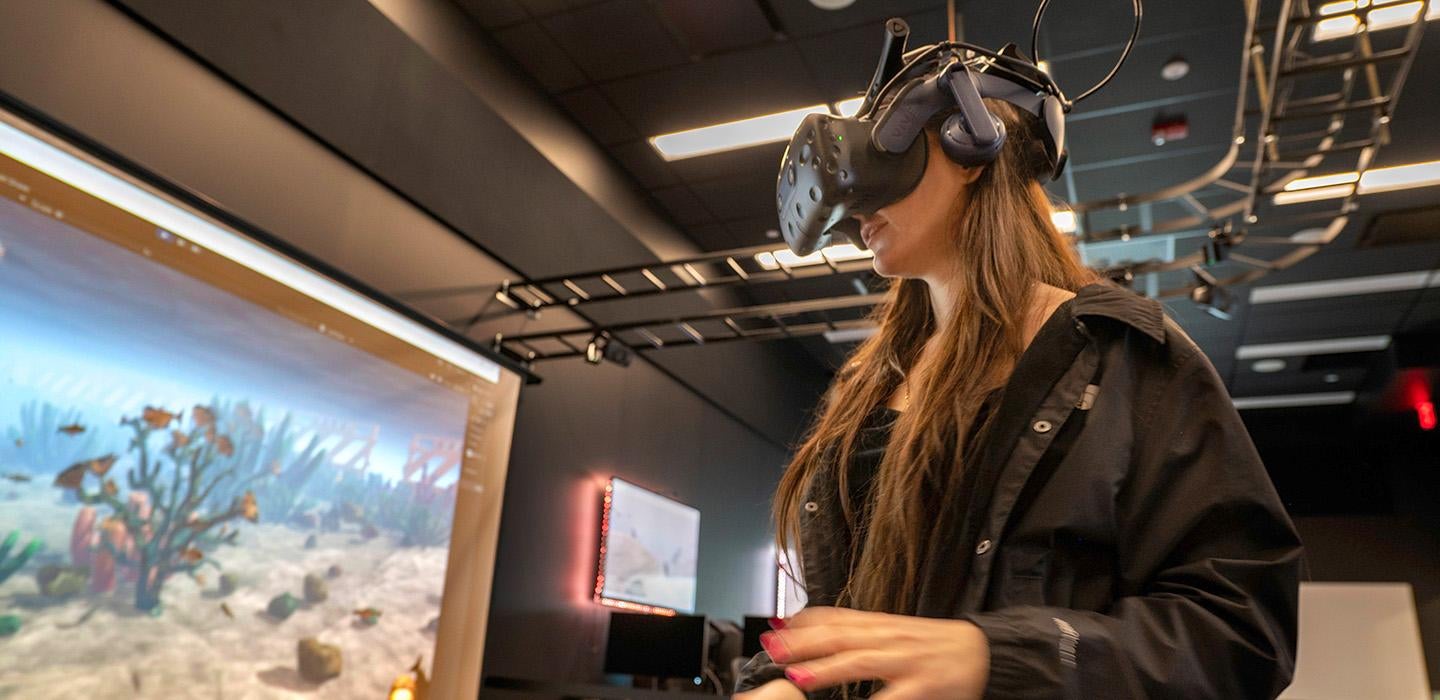
Subscribe to Pittwire Today
Get the most interesting and important stories from the University of Pittsburgh.You would never know from her sunny disposition that Sofiya Synychych’s interest in studying psychology is rooted in trauma — her own and her family’s.
As a senior psychology major at the University of Pittsburgh at Bradford, she is working with faculty members on a virtual reality experience to soothe the anxiety of those with PTSD.
Synychych was born in Ukraine and lived there until she started high school in Troy, Michigan, where her parents had moved to get away from the country’s war with Russia. They chose Michigan because of the area’s large Ukrainian population.
While living in Ukraine, her family was in the military, and the war that broke out when Russia invaded Crimea in 2014 affected her and her family daily. She went to live with her grandparents in the mountains, farther from the war, before eventually joining her parents in Michigan.
When it came time to choose a college, she wanted to explore a new area of the U.S. and attend a school with a good psychology program. After looking at the University of Pittsburgh, she saw the Bradford campus, and its mountains reminded her of her grandparents’ home in Ukraine. She also knew it would be easy to spend time doing things she loved, like snowboarding, skiing, hiking and camping.
Even though she and her family are now far from the war, they still experience varying degrees of post-traumatic stress disorder. “I want to figure out why some people can walk away from shooting incidents and some can’t, why some people process things differently,” she said. “That’s what got me really interested in psychology.”
Bridging cultural gaps
When she moved to Michigan, Synychych began seeing differences between herself and her new classmates.
She speaks fluent English, having learned the language in school growing up. She was not as fluent, she observed, in cultural communication. She said her American classmates often took things personally that Ukrainians wouldn’t.
Once she told an American classmate that she did not like their pants. The classmate was offended, but Synychych could not understand why. To her way of thinking, whether she liked the pants had nothing to do with whether she liked the person wearing them.
“So, I knew I wanted to understand how people tick,” she said. “I knew I wanted to go into psychology.”
Her first experiment was on herself. As an avid video game player, Synychych experimented with exposing herself to the things she feared via video games. It’s not something she recommends, she said, but the experience piqued her interest when Associate Professor Greg Page told his psychology capstone students they would work with students in Jeremy Callinan’s virtual reality programming and technology class.
The students developed a rock-stacking activity in which a person wearing a headset uses hand-held controllers to virtually balance rocks on top of each other as a form of meditation.
Next steps
Time ran out in the fall semester before Synychych and her peers could evaluate the effectiveness of their creation, but she wanted to keep going with research into the spring semester — and had an idea more ambitious that stacking rocks.
Synychych has spent the spring semester meeting weekly with Page and Callinan as they develop an application to simulate snorkeling. She designed the structure of the app, gave feedback at each step of development and wrote a script that leads users through meditative activities, such as breathing exercises and a “body scan” practice to release tension in different areas of the body.
After spring break, she will evaluate student stress levels before and after using the finished product. She will present her research at the University’s Undergraduate Research and Creative Expression Fair on April 8.
Page, director of the Pitt-Bradford psychology program, is pleased with the results of her extra semester of effort. “Her vision with this specific piece is so much more polished than it was in our capstone class,” he said.
— Kimberly Marcott Weinberg, photography by Glenn Melvin


